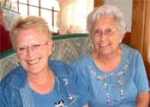Chairwomen bonded by experience

Thirteen years and the courage to wage one of the hardest-fought battles a person can face have formed the foundation of a friendship that will last two women a lifetime.
Shelly Beyer and Marilyn Anderjaska recognize the effect cancer can have on a person's life. Both have had first-hand experience.
Because of that experience and the positive outlook they have maintained through the course of their disease and recovery, they have been named honorary co-chairs of the American Cancer Society's Relay For Life, scheduled in McCook beginning Friday evening.
Both women are survivors of breast cancer, a devastating disease that has taken the lives of more than 25,000 American women to date in 2002.
"Cancer causes drastic changes in your life," said Marilyn. "The diagnosis is devastating. After you've heard the words, 'You have cancer,' your life revolves around blood tests and treatments. But there is a light at the end of the tunnel. Once you face up to your own mortality, you realize how precious every day of your life really is."
Shelly agreed. "Living with cancer makes you enjoy every day. You begin to realize the little things aren't as important as they used to be," she said.
"You don't realize there are cobwebs hanging on your wall until you start feeling better," she said with a laugh.
The two, along with a friend who recently lost her battle with cancer, formed a cancer survivor support group in 1989. "Yesterday's gone. Tomorrow's not here. All we ever really have is today so make every day count," is the theme adopted by the group.
Shelly has been diagnosed with cancer three times since 1976.
The treatment for her first bout with cancer was interrupted when she found out she was pregnant.
"We named our daughter Faith because I was on chemo when I got pregnant with her," Shelly said.
Infants who are exposed to chemotherapy in utero are at a much greater risk for leukemia in their early years, Shelly explained.
Because the doctors weren't sure how much of the drugs Faith had been subjected to, "We had to have a lot of faith that she would be all right," said Shelly.
Marilyn was diagnosed with cancer in 1989. During that time, she lost two close family members to cancer. "And I had three grandbabies born. That's what kept me going," she said. "You have to concentrate on the positive things."
And there are good things that come from having cancer, both women agreed.
"It changes your life and makes you look at things more positively. You learn to take life day by day and enjoy every day you have," Shelly said.
Because of the support group they helped form, the women understand not only the ups and downs of being a cancer victim, but also the pain of watching a loved one go through the same experiences they have encountered.
"When you are diagnosed you have to go through all the bad things," said Shelly referring to the grief that accompanies any life change. "The best thing anyone can do for a friend who has been diagnosed is to be supportive. It's a struggle -- a fight -- and people have to make their own way through it. But it's important to know there are friends around when they're needed."
"People with cancer need to be able to talk to supportive people about their disease. Those friends and loved ones need to be more comfortable with talking to cancer victims. A diagnosis of cancer is not a death sentence."
It is, however, life challenging and life changing, she said.
The donations raised by participants during this year's Relay For Life will go to the American Cancer Society.
The American Cancer Society is a results oriented organization which, in the last 10 years, has funded 32 research scientists whose work on cancer research has earned them Nobel Prize recognition.
In addition, as the largest not-for-profit voluntary health organization in the United States, the society has granted more than $100 million to cancer research in a single year.
It has provided funding for breakthroughs in cancer treatment such as tamoxifen, bone marrow transplants and molecular therapies that translate into millions of saved lives each year.
Since 1996, American Cancer Society has reported sustained declines in overall cancer incidence and mortality rates.
"The American Cancer Society can't buy everybody's drugs. What they do is give hope for a cure to patients who may be diagnosed in the future," Marilyn said.
There is still time to donate to the annual event. For more information call Barb Bortner at McCook Community Hospital (308) 345-2650.
